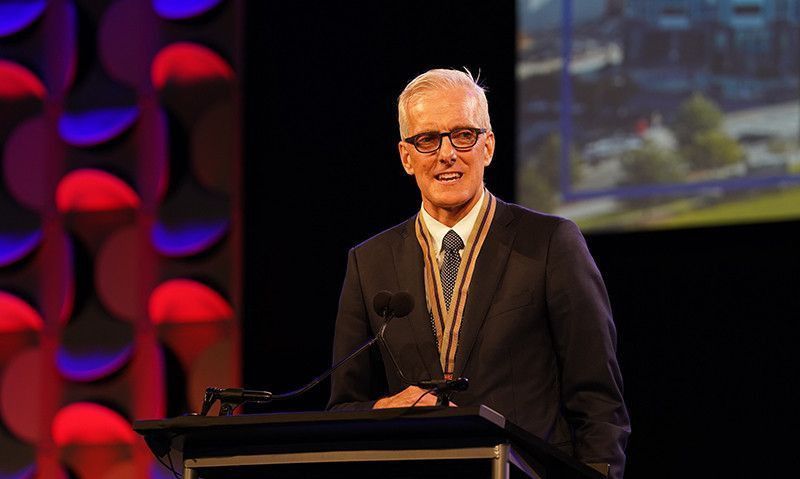
As part of September’s Suicide Prevention Awareness Month, VA Secretary McDonough outlines initiatives aimed at ‘our No. 1 clinical priority.’
The American Legion and Department of Veterans Affairs (VA) both list reducing the number of veterans who die by suicide as a top priority.
Launched in 2021, The American Legion’s Be the One mission aims to destigmatize asking for help, while empowering everyone — veterans, servicemembers and civilians — to take the appropriate action when the life of a veteran or servicemember is at risk.
VA has a range of initiatives that are geared toward getting veterans in crisis the help they need. The most well-known — and for urgent cases — is the 24/7 confidential hotline. Veterans can call 988 and press 1 to be immediately connected to a counselor.
As part of September’s Suicide Prevention Awareness Month, VA Secretary Denis McDonough discussed his department’s key initiatives, The American Legion’s role and more.
Question: Tell me about VA’s key initiatives to reduce the number of veterans we lose to suicide.
Answer: This is our No. 1 clinical priority. And we obviously are taking advantage of September to underscore this, but this is a priority every day, of every week, of every month, of every year. I want to just highlight three things.
One, there's a new law, it's called the COMPACT Act (here’s what it means for veterans). If you're a veteran and you're in crisis, and you want to go see a provider, whether you're enrolled in VA or not, this new law allows you to go to a VA hospital or another hospital and get that emergency care. And we'll make sure that we pay for that.
In less than a year, already 32,469 veterans have taken advantage of it. If you need somebody in crisis, don't wait.
Second, you may be far from a hospital. If you're in crisis and you're far from a hospital, pick up a phone and call us. Dial 988 and press 1. We'll get you in touch with mental health professionals, if that's what you need.
Third, you may not be in crisis now, or you might be a family member and you just want to be prepared in the event that there might be a crisis. In which case, what we say is ‘Don't wait, reach out, and reach out now.’ Visit us at va.gov/reach. And you'll see on that site a bunch of useful information, tips, contacts that we've developed with our mental health professionals, to make sure that people are prepared now in the event that crisis comes later.
We want vets to know we're here. It's natural to find oneself wrestling with mental health challenges. You don't have to wrestle alone. Family members. You don't have to wrestle alone if your vet is struggling.
Question: Those efforts correlate to The American Legion's Be the One initiative, which is empowering veterans, servicemembers, their family members, anyone to ‘Be the One’ if a veteran's life is at risk. Tell me about how that plays into the joint effort to get a handle on veteran suicide, and what it means to have The American Legion making this our number one priority.
Answer: With Be the One, the Legion — as a strong national and strong community leader — is challenging not just its members but everybody to be the one, to be there for our veterans, to keep your eyes peeled, to make sure that you're the one who reaches out and checks in on our veterans. We're trying to emulate that.
That's exactly what we need, which is every community across the country, looking out for our vets. Mindful that every one of us not only has the obligation, but every one of us can be that pivotal interlocutor. It's an amazing challenge, and you're showing that it works. We're trying to emulate that with many of the things we're doing.
There is something called the Sgt. Fox Suicide Prevention Grants. We just issued 80 grants to community organizations.
This is a simple concept based on exactly what the Legion is challenging us to do, which is local communities know their veterans best. So the Fox Suicide Prevention Grants program says, ‘Hey, let's invest in local community organizations who know their vets best,’ and therefore they know what's going to work to get vets their care. They know who can ‘Be the One,’ and they already have organizations that are being the one to watch out for veterans. That's really a great opportunity.
One of the things we also know, and Be the One underscores this, is we want some distance between a veteran in crisis and lethal means. When you're in your local community, you're keeping your eye out for a veteran in crisis, you can help create that distance. But we also have other tools. Gun safes, gun locks, just so that has some distance between that time of crisis and the lethal means.
Because what we know now is suicidal ideation, this is not a months long or weeks long thing. This is hours, in some cases minutes, in some cases seconds. When lethal means are locked, that helps us.
Question: When you're assessing progress made by all these efforts, VA's Be the One, USAA's Face the Fight, looking into the future, what would success with respect to the veteran suicide rate look like?
Answer: Bottom line is we won't rest until it's zero, right? That's what success looks like. And the clarity and the strength that comes from that goal is very motivating, but it's also based on a simple concept, which is every single one of our veterans is a person made from an image of God, a hero who has taken an unbelievable oath to protect us all. And we want everyone to be with us. We won't rest until that's the case.
- Be the One

